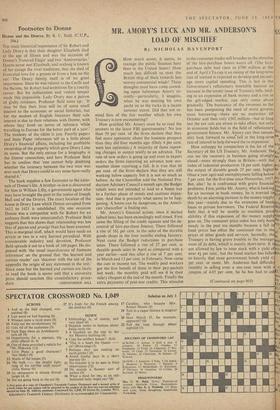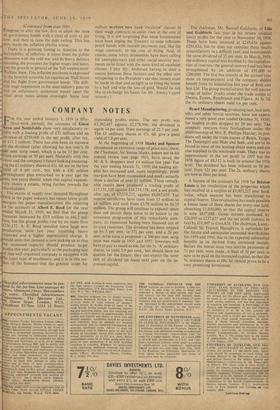MR. AMORY'S LUCK AND MR. ANDERSON'S LOAD OF MISCHIEF
By NICHOLAS DAVENPORT
How gratified Mr. Amory must be to read the answers to the latest FBI questionnaire! No less than 59 per cent. of the firms declare that they feel more optimistic about the business prospect than they did four months ago. (Only 4 per cent. were less optimistic.) A majority of those report- ing changes in output testify to an advance. The rate of new orders is going op and even in export orders the firms reporting an advance now out- number those reporting a fall. It is true that 60 per cent. of the firms declare that they are still working below capacity but it is not so much as before' As the Chancellor told the National Pro- duction Advisory Council a month ago, the Budget reliefs were not intended to lead to a boom but to a further phase of steady and cautious expan- sion. And that is precisely what seems to be hap- pening. A boom can be dangerous, as the Ameri- can 'chancellor' is finding out.
Mr. Amory's financial action, once it started (albeit late), has been exceedingly well timed. First came the lifting of the credit squeeze and the de- control of hire-purchase finance. There followed a rise of 16} per cent. in the sales of the durable goods shops in the four months ending January. Next came the Budget reductions in purchase taxes. There followed a rise of 27 per cent. in durable goods sales in April as compared with a year earlier—and this after a rise of 7 per cent. in March and 13 per cent. in February. Now come the cuts in income tax. The weekly paid workers got the first benefit of these in their pay-packets last week; the monthly paid will see it in their salary cheques at the end of the month. Finally the extra payments of post-war credits. This stimulus to the consumer trades will broaden as the stimulus of the hire-purchase boom wears off. (The hire- purchase debt had risen to £700 million at the end of April.) To cap it an easing of the longterm rate of interest is expected to develop and encour- age more capital spending. This is last in the Government's reflationary timetable because an increase in the tender issue of Treasury bills, lead- ing to an expansion of bank money and a rise in the gilt-edged market, can only come about gradually. The buoyancy of the revenues so far has been postponing the need of extra govern, ment borrowing—there are no maturities till October and then only £302 million—but at long last the tax cuts are about to take effect, not only in economic fields but in the field of reflationary government finance. Mr. Amory can thus reason- ably look forward to some fall in the long-term rate of interest to help forward the re-expansion.
How unhappy by comparison is the lot of the Secretary of the US Treasury, Mr. Anderson. He can see the recovery in business going strongly ahead—more strongly than in Britain—with the index of industrial production 18 per cent. higher, the output of durable goods 25 per cent. higher (than a year ago) and unemployment falling below 5 per cent. for the first time since November, 1957. But, alas! he is confronted with grave financial problems. First, unlike Mr. Amory, who is looking for an increase in bank money, he is worried to death by an alarming increase in the money suppl this year—mainly due to the extension of ban loans to private borrowers. The Federal Resery feels that it will be unable to maintain pric stability if this expansion of the money suppl goes on. The consumer price index has only bee steady in the past ten months because a fall i food prices has offset the continued rise in th prices of other goods and services. Secondly, th Treasury is having grave trouble in the manage ment of its debt, which is mainly short-term. It i not allowed by law to issue stock with a yield o over 44- per cent., but the bond market has fallen so heavily that most government bonds yield 41 per cent. or more. Mr. Anderson had difficult recently in selling even a one-year issue with coupon of 4.05 per cent. So he has had to as (Continued on page 903)
II
n nt
1
ry y
h.
ea Pt all ri1 h
ti
p he ep ,1 f 13(I nts; it or
net
7,7 Or
(Continued from page 900)
Congress to alter the law, first to allow the issue of government bonds with a yield of over 41 per cent. and then to raise the debt ceiling. This has only made the inflation phobia worse.
There is a growing feeling in America in the inevitability of inflation. It stems from the public obsession with the cold war and its heavy defence spending, the pressures for higher wages and taxes, and the growth in general of the 'full employment' Welfare State. This inflation psychosis is expressed in the feverish scramble for equities on Wall Street and the flight from government bonds. The
cult wage negotiation in the steel industry goes on and an inflationary settlement would upset the retail price index almost overnight. Some four million workers now have 'escalator' clauses in their wage contracts to cover rises in the cost of living. It is not surprising that some businessmen have been urging the Treasury to issue inflation- proof bonds with interest payments tied, like the wage contracts, to the cost of living. And, of course, some leftist economists have been calling for unemployment and other social security pay- ments to be fitted with the same kind of escalator clauses. 1 pity Mr. Anderson having to steer a course between these fanatics and the other sort whispering in the President's ear that money must be made so dear and so tight as to bring the boom to a halt and stop the loss of gold. Would he not like to exchange his boom for Mr. Amory's quiet recovery?







































 Previous page
Previous page